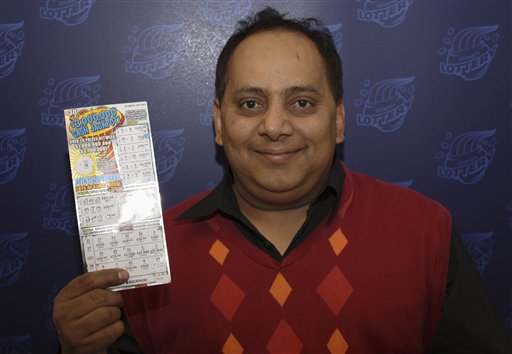CHICAGO — Authorities on Friday exhumed the body a Chicago man who was poisoned with cyanide after winning the lottery and conducted an autopsy in the hopes that it will help solve the mystery surrounding his death.
The body of Urooj Khan was exhumed from a cemetery Friday morning and placed inside a black hearse, which was escorted by four police cars to the Cook County Medical Examiner’s Office.
Pathologists collected samples of hair, nails and most major body organs, as well as contents of the stomach, Medical Examiner Stephen Cina said. Tests might determine whether Khan swallowed, inhaled or was injected with the poison, Cina said.
Khan, 46, died in July as he was about to collect $425,000 in lottery winnings. His death initially was ruled a result of natural causes. But a relative whose identity remains a mystery asked for further tests that revealed in November that he had been poisoned.
Khan was given a religious burial and his body was not embalmed. The body was wrapped in a shroud and placed inside a wooden box with a Styrofoam lid that was itself inside a concrete vault. Cina said the body had not come into contact with soil from the grave.
“The body was in a state of advanced decomposition, but we were able to identify the major organs and take samples of each of these for toxicological analysis,” Cina said.
Given the length of time Khan’s body was in the ground, Cina said it was not certain investigators would be able to determine exactly how he ingested the poison.
“I can’t really predict how the results are going to turn out. Cyanide over the post mortem period actually can essentially evaporate and leave the tissues. So it is possible that cyanide that was in the tissues is no longer in the tissues after several months,” he told reporters during an afternoon news conference.
But Cina said that after the autopsy that lasted a couple hours he remains convinced Khan was the victim of a homicide.
“We’ve already determined it was a homicide,” he said. “I didn’t see anything that changed that.”
Khan’s wife, Shabana Ansari, and other relatives have denied any role in his death and expressed a desire to learn the truth.
Authorities remain tightlipped about whom they may suspect.
At dawn Friday, a backhoe at Rosehill Cemetery began scooping up dark clumps of ground hardened by the cold weather. Two men then finished the work with shovels, and a Muslim cleric said prayers beside Khan’s grave. His body was placed in a white bag and loaded into a hearse.
One of Khan’s brothers was present, along with officials from the medical examiner’s office and Chicago police detectives. Police kept about half a dozen TV news crews at a distance, beyond the cemetery’s fence, and two news helicopters circled overhead.
Khan had moved to the U.S. from his home in Hyderabad, India, in 1989, setting up several dry-cleaning businesses and buying into some real-estate investments.
Despite having foresworn gambling after making the haj pilgrimage to Mecca in 2010, Khan bought a lottery ticket in June. He said winning the lottery meant everything to him and that he planned to use his winnings to pay off mortgages, expand his business and donate to St. Jude’s Children’s Research Hospital.
He was just days from receiving his winnings when he died before dawn on July 20.
The night before, Khan ate dinner with his wife, daughter and father-in-law at their house. Sometime that night, Khan awoke feeling ill. He died the next morning at a hospital.
Khan died without a will, opening the door to a court battle. The businessman’s widow and siblings fought for months over his estate, including the lottery check.
Send questions/comments to the editors.



Success. Please wait for the page to reload. If the page does not reload within 5 seconds, please refresh the page.
Enter your email and password to access comments.
Hi, to comment on stories you must . This profile is in addition to your subscription and website login.
Already have a commenting profile? .
Invalid username/password.
Please check your email to confirm and complete your registration.
Only subscribers are eligible to post comments. Please subscribe or login first for digital access. Here’s why.
Use the form below to reset your password. When you've submitted your account email, we will send an email with a reset code.